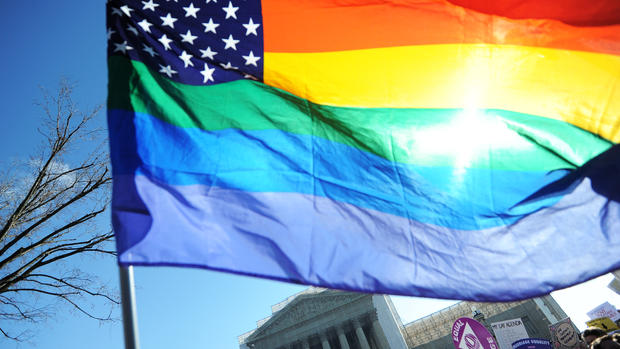Supreme Court's same-sex marriage decision poses new questions for Republicans
It took just a few words for the Supreme Court to deal with the question of whether gay marriage is legal. For Republicans thinking about running for the White House in 2016, it won't be that easy.
The court's decision Monday to reject appeals from five states that sought to prohibit same-sex marriage reignited a debate inside the GOP between pragmatic Republican officials eager to avoid a fight over a divisive social issue and religious conservatives, a vocal minority that vowed to redouble its efforts and punish those unwilling to join them.
"For us, it's over in Wisconsin," said Republican Gov. Scott Walker, whose state's appeal was among those the court declined with a two-word order, "certiorari denied" - meaning the lower court's ruling stands.
Walker is seeking re-election in November and is expected to run for president in 2016 if he prevails.
"To me, I'd rather be talking in the future now more about our jobs plan and our plan for the future of the state," Walker said. "I think that's what matters to the kids. It's not this issue."
But for Texas Sen. Ted Cruz, the move by the high court was a rallying cry. The favorite of religious conservatives vowed to introduce a constitutional amendment designed to prevent "the federal government or the courts from attacking or striking down state marriage laws."
While the decision is a setback for the gay rights movement's goal of achieving marriage equality nationwide, it does allow the lower court rulings in those five states to stand - all in favor of marriage equality. That means same-sex couples in Indiana, Wisconsin, Utah, Oklahoma, and Virginia will be able to get married.
The decision also leaves in place rulings from the Fourth, Seventh and Tenth Circuits, meaning same-sex marriage will soon be allowed in West Virginia, North Carolina, South Carolina, Kansas, Colorado and Wyoming. Once same-sex marriage is allowed in those states, the number of states where same-sex marriage is legal will bump from 19 to 30.
A decade ago, then-President George W. Bush won re-election in part by supporting ballot initiatives in several states seeking a constitutional ban on gay marriage, boosting turnout among motivated conservative voters. Support for legal same-sex marriage has grown swiftly in the years since, and several polls have found that majorities of Americans are in favor of legal recognition for gay marriages.
But for religious conservatives who hold outsized influence in Republican presidential contests in the early voting states of Iowa and South Carolina, the issue resonates.
"If you're a candidate for president who refuses to oppose homosexual marriage, I don't see how you get elected," said Steve Scheffler, a Republican national committeeman from Iowa. "You're going to get clobbered."
Ralph Reed, chairman of the Faith and Freedom Coalition, issued a warning for anyone eyeing the 2016 presidential contest: "There will be no avoiding this issue."
That's exactly what some Republicans contemplating presidential bids would like to do.
New Jersey Gov. Chris Christie pleaded ignorance when asked about the court's decision Monday at a campaign appearance in Connecticut.
"I haven't had a chance to read it," said Christie, who drew fire from cultural conservatives last year when he declined to appeal a court ruling legalizing gay marriage in his state. "I don't give comments based on headlines."
Indiana Gov. Mike Pence said in a statement he was disappointed by the ruling, adding that while he believes "in the importance of traditional marriage," he would abide by the rule of law.
"People are free to disagree with court decisions but we are not free to disobey them," he said.
At an event in Washington, Louisiana Gov. Bobby Jindal, whose state has an active case that was not among those considered Monday by the Supreme Court, had a muted reaction.
"I continue to believe in traditional marriage, but the ball's certainly in the court's court," he said.
Among the GOP's crowded 2016 class, only a handful of potential contenders - Cruz and former Arkansas Gov. Mike Huckabee, among them - aggressively criticized the court's decision. Both will need support from religious conservatives to fuel a potential presidential bid.
"It is shocking that many elected officials, attorneys and judges think that a court ruling is the `final word,'" Huckabee said. "It most certainly is not."
Other would-be Republican White House candidates have demonstrated how tricky the politics of gay marriage can be.
Florida Sen. Marco Rubio supports marriage between a man and a woman, but has urged tolerance for gay couples. He also spoke out in July about what he called a "growing intolerance" against people who oppose same-sex marriage.
Ohio Sen. Rob Portman - considered a front-runner in Mitt Romney's 2012 search for a running mate - announced last year he decided to support same-sex marriage after learning his son is gay. The onetime co-sponsor of the 1996 Defense of Marriage Act (DOMA) received much personal support from within his party, but just as much rebuke for basing his policy position on emotion.
The divide is often on display among Republicans even in the same state.
South Carolina Attorney General Alan Wilson on Monday promised to continue fighting to uphold the state constitution's ban on gay marriage. Former state GOP chairman Katon Dawson, however, said there would be "bigger fish to fry."
He cited escalating violence around the world and the nation's tepid economic recovery. "2016," he said, "isn't going to be about gay marriage."
